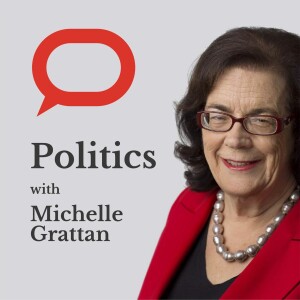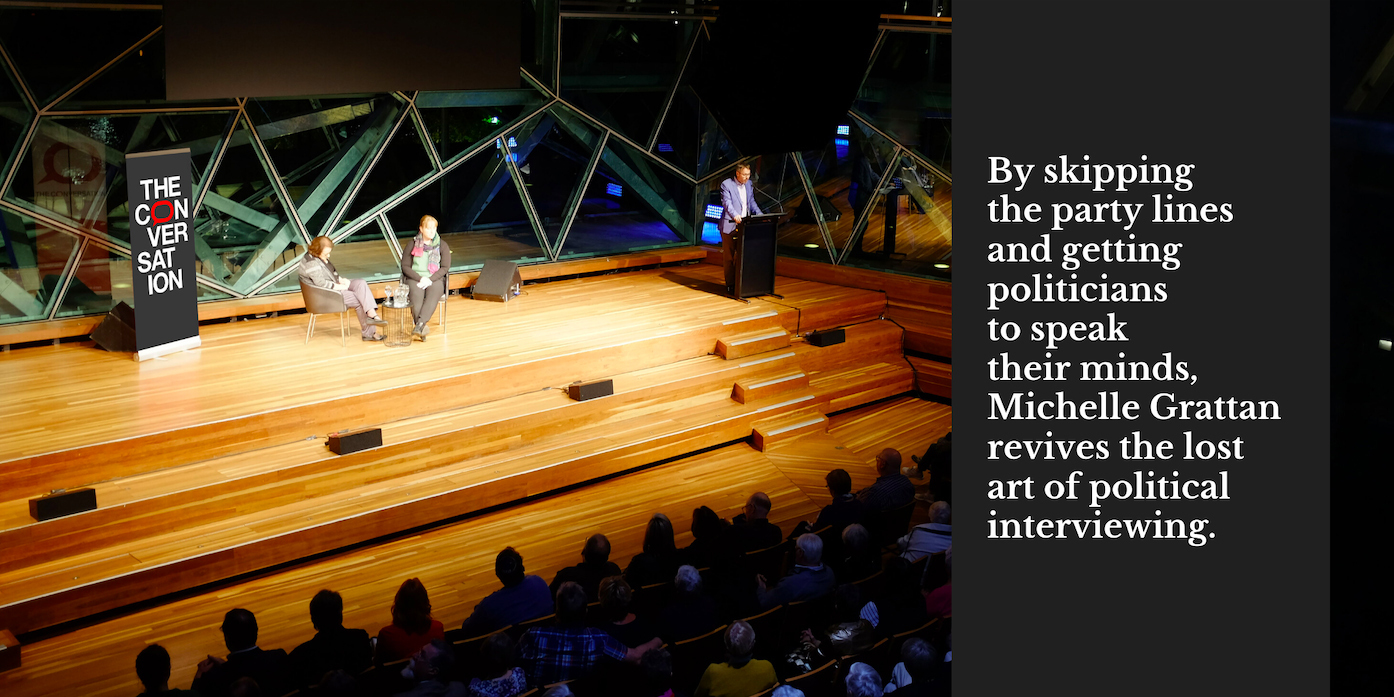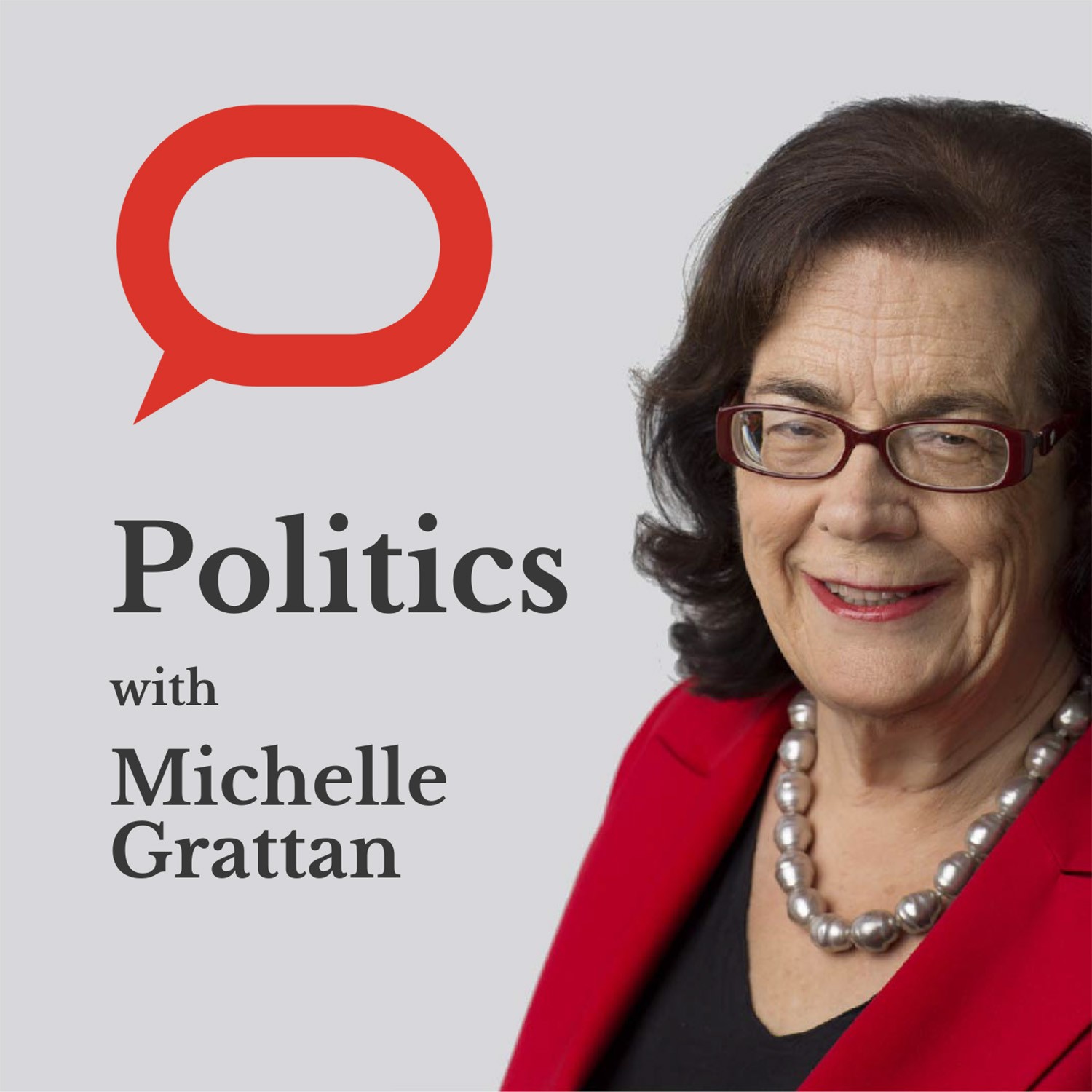Episodes

Thursday Aug 25, 2022
David Littleproud on charting his course in opposition
Thursday Aug 25, 2022
Thursday Aug 25, 2022
David Littleproud runs his own race. In opposition he’s Nationals leader first and Coalitionist second. Thus he was quick out of the blocks criticising Scott Morrison’s power grab, and when Peter Dutton rejected an invitation to next week’s jobs and skills summit, Littleproud said he wanted to go.
In this Podcast Littleproud says about the government’s planned inquiry into Morrison’s actions: “I’m happy to work within whatever the constraints of what the government decides, that’s their prerogative. But it just seems to me this has now become an obsession of Anthony Albanese.”
Of the conflicting signals from the opposition about the jobs summit, Littleproud says: “We’re two separate parties. I represent the National Party and Peter Dutton represents the Liberal Party. He made a decision on behalf of the Liberal Party that he would not attend.”
He’s scathing that the Nationals were not originally invited. “The fact that this government didn’t even bother to ask anyone from regional and rural Australia to represent their interests was a failing to start with.”

Tuesday Aug 23, 2022
Tuesday Aug 23, 2022
As well as her interviews with politicians and experts, Politics with Michelle Grattan includes “Word from The Hill”, where she discusses the news with members of The Conversation politics team.
In this podcast, politics editor Amanda Dunn and Michelle discuss the solicitor-general’s advice on Scott Morrison’s secret appointment to multiple ministries, which flouted “responsible government”. Morrison’s action will now be scrutinised by an inquiry.
They also canvass next week’s jobs and skills summit, where the government will be seeking agreement on immigration and improving industrial relations.

Thursday Aug 18, 2022
Crossbencher Helen Haines on Morrison and integrity
Thursday Aug 18, 2022
Thursday Aug 18, 2022
The revelation that Scott Morrison secretly had himself appointed to five separate portfolios has triggered widespread outrage, just when the broader question of integrity has been a big political issue.
In this podcast, Michelle Grattan speaks with Independent member for Indi Helen Haines, who has pushed for a national integrity commission. Such a body will soon be legislated by the Albanese government.
Haines strongly condemns Morrison’s behaviour, although she doesn’t see it as the sort of matter that would go to an integrity commission. “It doesn’t appear apparent to me that there are questions here of corruption. But we don’t know really what motivated the prime minister to keep all of this a secret.”
Haines says an Anti-Corruption Commission needs to have the capacity to investigate what has been dubbed “grey” corruption, such as jobs for the boys and pork barrelling.
She argues that “public money being spent for political gain through so-called rorting or pork barrelling is potentially corruption.”
“These bodies are seeking to stamp out corruption and they are seeking to shine a light in dark places. Now, in shining that light, they may well determine that there’s nothing to be seen.
"But on the other hand, they may well find that there are practices which have been accepted as kind of matey and okay that in fact lead to poor governance, that lead to poor public policy, that lead to an erosion of trust in our leaders.”
“There needs to be a pathway that communities can see is fair and just. [So] that if you need a hospital in your electorate (as indeed I do), if you need new roads or a bridge or whatever it might be, that there’s a clear pathway to applying for those funds, putting forward a case, and a legitimate system that shows where you are in the queue to achieving the infrastructure that you need in your community.”
In her maxim for integrity in politics, Haines says politicians need to “be what you want to see.”

Tuesday Aug 16, 2022
On Scott Morrison’s bizarre power grab
Tuesday Aug 16, 2022
Tuesday Aug 16, 2022
As well as her interviews with politicians and experts, Politics with Michelle Grattan includes “Word from The Hill”, where she discusses the news with members of The Conversation politics team.
In this podcast, politics editor Amanda Dunn and Michelle discuss this week’s revelations that former prime minster Scott Morrison had himself secretly sworn into five different portfolios. They talk about the criticisms some are making of Governor-General David Hurley for his role, and the political fallout which has seen one Liberal frontbencher, Karen Andrews, saying Morrison should leave parliament.

Thursday Aug 11, 2022
Thursday Aug 11, 2022
The Chinese reaction to United States Speaker Nancy Pelosi's Taiwan visit further escalated tensions in our region, as China becomes more bellicose in language and action.
On Wednesday, China's Ambassador Xiao Qian spoke at the National Press Club. He talked about wanting a positive relationship between Australia and China, while reiterating China's uncompromising line towards Taiwan, and giving a chilling prediction of what the Taiwanese would be in for post reunification.
"The least thing we are ready to do is use force. That is one of the reasons why China has been so patient for several decades. [...] We're waiting for a peaceful unification. But [...] we can never rule out the option to use other means [...] when compelled, we are ready to use all necessary means."
“My personal understanding is that once Taiwan is united, come back to the motherland, there might be process for the people in Taiwan to have a correct understanding of China.”
In this podcast, Michelle Grattan speaks with Nick Bisley, Professor of International Relations at La Trobe University, an expert in Asian foreign relations and Australia's foreign and defence policy.
Bisley says "what we are probably entering into, at least for the next few months, is a period of much sharply-heightened instability and military kind of friction in and around Taiwan".
"China has made very clear for decades now that under certain circumstances it would use military force to deal with what it sees as a rogue province. And those circumstances are largely around a unilateral declaration of independence by Taiwan or some other really significant move away from the old status quo."
"I think what what we see out of this crisis is that China's risk appetite has gone up and its willingness to put up with what it sees as kind of provocations has gone down.
"So the likelihood of them using military force to coerce Taiwan – it's not going to happen this year or next year, but its likelihood of occurring in the next four to five years has distinctly increased."
On whether there is the likelihood of a conflict between China and the US as tensions between the two nations continue to rise, "the constraints that domestic politics puts on each side means that we could end up in a situation where they are backed into a corner and find that there's few ways out other than some kind of military action, which then escalates."
But "if there is a proper conflict between the US and China, everyone loses pretty significantly."
"When we look back in February 2022, thinking about what Putin would do in relation to Ukraine, we all thought he's not going to do a full-blown invasion. It doesn't make any sense. It's not in his interest to do so. I think we've always thought that about Taiwan. It's just not in the US's interest to do the full-blown military operation. And the lesson has got to be from Ukraine, is that sometimes rationality doesn't always win."
On whether the Albanese government is handling the rising tensions with China well, Bisley says: "They're playing a reasonable hand in what is a pretty difficult set of circumstances."

Thursday Aug 04, 2022
Tom Calma on the Indigenous Voice to parliament
Thursday Aug 04, 2022
Thursday Aug 04, 2022
The Albanese government has released the draft wording for enshrining an Indigenous Voice to parliament in the constitution. Anthony Albanese is making a referendum a priority but history tells us how hard these are to pass.
Tom Calma, Chancellor of the University of Canberra, has been a leading participant in Indigenous affairs for many years. He and professor Marcia Langton prepared a report for the Morrison government on the Voice. They recommended a Voice structure involving local and regional levels as well as the national level.
The Albanese government has not spelled out a detailed model for the Voice it proposes, but the extensive consultations Calma and Langton undertook produced insights that will help shape the conversations ahead.
“We’ve got to understand that when we talk about the Voice through referendum changes to the Australian constitution, [it] is only about Commonwealth legislation and not about state and territory legislation,” Calma tells the podcast.
He says during the consultation process, people said “we support a national voice, but don’t forget us at the local and regional level, because that’s where all the action takes place”.
“When we look at education, employment, health service delivery, all of that takes place under a state or territory jurisdictional level, supplemented by funding from the Commonwealth. It’s administered through the states and territories by and large.”
Calma says regional groups could “do the canvassing of the membership and push that up to the national-level voice”.
“There needs to be these other regional level arrangements and all the [federal] government needs to do is to agree to that – and then the dialogue can start with the states and territory governments to build up what form it might take.
"But none of this is coming out cold because in every state and territory, they’ve already got some form of arrangement. And this is really about saying, how do we maximise the impact of the current arrangements, give them a secretariat, give them some guidance and support and make it an inclusive body?”.
The proposed Voice, Calma stresses, “is about giving an Aboriginal and Torres Strait Islander person’s perspective on that new legislation. But it has no other authority to veto or to direct politicians on how to think. This is only an advisory body and to make comment, so we have formal input by Aboriginal Torres Strait Islander people into legislation that most affects us.”
Calma says Aboriginal and Torres Strait Islander people “don’t always speak with the same voice and we all have different experiences, we represent different demographics and so forth.”
He rejects the argument that a Voice isn’t needed because there are 11 Indigenous members of the federal parliament. “We can’t expect that the elected politicians […] are going to be able to give a view for all Aboriginal or Torres Strait Islander people.”
“What we envisage is that the Voice […] will be able to work with the bureaucrats in providing Aboriginal and Torres Strait Islander perspective to bills, so that by the time [legislation] reaches parliament a lot of the issues might already be sorted out […] Once that relationship with Commonwealth agencies and departments starts to mature, hopefully those departments and agencies will work with the Voice group to look at their existing policies and programmes.”
“The Voice would not be usurping the role of any existing organisation. It would be about partnership, it’s about capacity development, it’s about inclusion.”
“I’m very confident that we could work cooperatively with the parliaments of the day - and that’s both the federal and the state and territory parliaments - for the betterment of Aboriginal and Torres Strait Islander people”.

Tuesday Aug 02, 2022
Peter Dutton puts nuclear power on opposition’s agenda
Tuesday Aug 02, 2022
Tuesday Aug 02, 2022
As well as her interviews with politicians and experts, Politics with Michelle Grattan includes “Word from The Hill”, where she discusses the news with members of The Conversation politics team.
In this podcast, politics editor Amanda Dunn and Michelle canvass Tuesday's decision by the Reserve Bank to raise the cash rate again, by 50 basis points to 1.85%.
They also talk about Peter Dutton's announcement that the opposition will inquire into nuclear power, in a contentious decision as it looks to crafting an energy policy for the next election. Most immediately, the Coalition will vote against the government's legislation for its 43% 2030 emissions reduction target. The vote in the House of Representatives will be this week.
Meanwhile, after Anthony Albanese's weekend Garma speech, attention this week also turned to the proposed referendum to put into the constitution an Indigenous "Voice" to parliament.

Tuesday Jul 26, 2022
Is Morrison’s absence from parliament disrespectful to his voters?
Tuesday Jul 26, 2022
Tuesday Jul 26, 2022
As well as her interviews with politicians and experts, Politics with Michelle Grattan includes “Word from The Hill”, where she discusses the news with members of The Conversation politics team.
Politics editor Amanda Dunn and Michelle talk about the opening of the 47th Parliament, the prospects for the climate legislation that seeks to enshrine the 43% emissions reduction target, and Treasurer Jim Chalmers’ economic statement, which will come hard on the heels of another bad inflation number. They also ask: should Scott Morrison be in the House this week?

Wednesday Jul 13, 2022
Health Minister Mark Butler warns COVID wave will worsen
Wednesday Jul 13, 2022
Wednesday Jul 13, 2022
With COVID cases surging in a new wave and half the winter still ahead, the news from Health Minister Mark Butler isn’t good.
“We haven’t reached the peak of the wave yet,” he tells the podcast. “Case numbers are going to continue to climb over the coming weeks […] and as a result, hospitalisations are going to continue to climb as well.”
The response, he says, is “a question of balance”.
People accept “that wearing a mask does reduce transmission”, but “we’re not going to move into lockdowns. We’re not going to see very broad-based mandates or government orders.”
Health authorities, as much as political leaders, recognise that “to get a balanced community response, you need to have a mix of targeted mandates”.
“We’ve had them all through the course of this year. So, for example, visitors to aged care facilities, to health facilities, public transport, aeroplanes – either where there is very high risk of transmission or where there is a population at high risk of severe illness.”
“You will continue to see those targeted mandates, I think, for some time. But beyond that, there is really strong advice, clear advice given to people about about using the common sense lessons that we’ve learnt over the last couple of years.”
“What we don’t want to end up with is a position where the community thinks government is being heavy handed or just continuing a situation which the community tolerated very well over [..] the first two years of the pandemic, but I think is starting to reach the end of their tether about.”
He defends not extending payments to workers forced to stay at home with COVID. “They are hard decisions for government not to continue those emergency payments. But as a number of us, from the Prime Minister to the Treasurer and myself, have made clear over the last few days, we’ve taken the hard view that we simply can’t continue emergency payments, very expensive emergency payments, forever with the budget that’s one trillion dollars in debt.”
“We’ve all hoped and maybe concluded that maybe this thing’s over. And every time that’s been the case, this virus has mutated again. It’s become more infectious. It keeps coming back. And so we are moving into a different phase of the pandemic where we recognise that the virus is endemic in Australia. It’s deeply established. We’ve got millions of people [who] have had it, hundreds of thousands of people have it today. And we need to find a response to the pandemic that reflects that, that we have moved out of an emergency phase.”
The pandemic has put huge pressure on already faltering hospital systems.
“We are going to have to have a good, long, hard talk to states about the position of the hospital system. The head of Prime Minister and Cabinet and his colleagues that head the premiers’ departments, are working on that right now.”
“But we also need to recognise that a lot of the pressure on our hospitals reflects the running down of general practice, the running down of aged care staffing arrangements, and as the Commonwealth has responsibility directly for those areas the best thing we can do in the immediate term to relieve pressure on our hospitals is to rebuild general practice, to strengthen Medicare and to put nurses back into nursing homes.”
Health ministers have agreed to meet on a monthly basis, and “to have a very early meeting dedicated just to these [health] workforce challenges”.
The problems facing the caring economy will be discussed at the September 1-2 jobs summit. “We know that the engine room of jobs growth really over coming years and decades will come from the health sector, the aged care, disability and early childhood sectors. So there will be a strong discussion, strong representation at the jobs summit around the care economy.”

Tuesday Jul 12, 2022
‘Pandemic fatigue’ takes its toll of mandates and even the expert health advice
Tuesday Jul 12, 2022
Tuesday Jul 12, 2022
As well as her interviews with politicians and experts, Politics with Michelle Grattan includes “Word from The Hill”, where she discusses the news with members of The Conversation politics team.
Politics editor Amanda Dunn and Michelle discuss the rising number of COVID cases, and state governments’ reluctance to bring back mandates such as for mask-wearing. These governments know many of the public have COVID fatigue, when it comes to restrictions. And even the “health advice” doesn’t count for quite what it used to.
Amanda and Michelle also canvass the challenges of the Albanese government’s September 1-2 jobs summit. More immediately, there is the Prime Minister’s latest foreign summitry, in Fiji, where he will be attending the Pacific Islands Forum.

